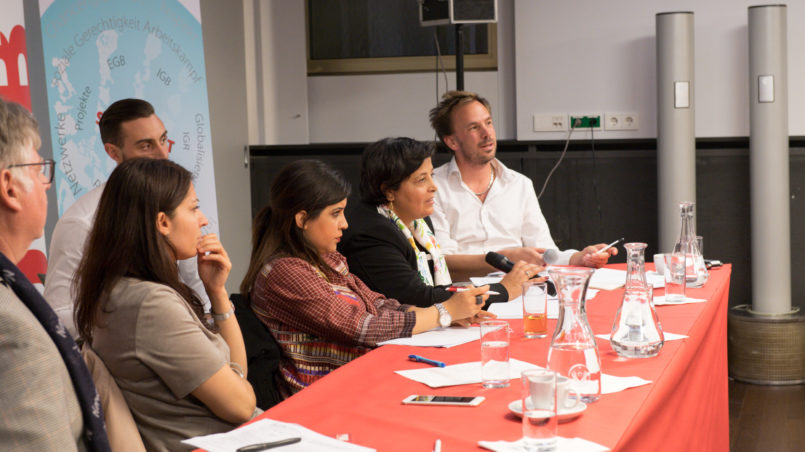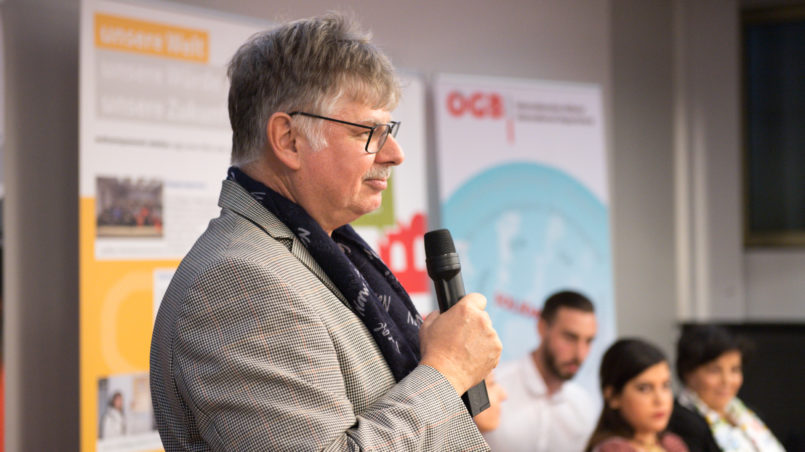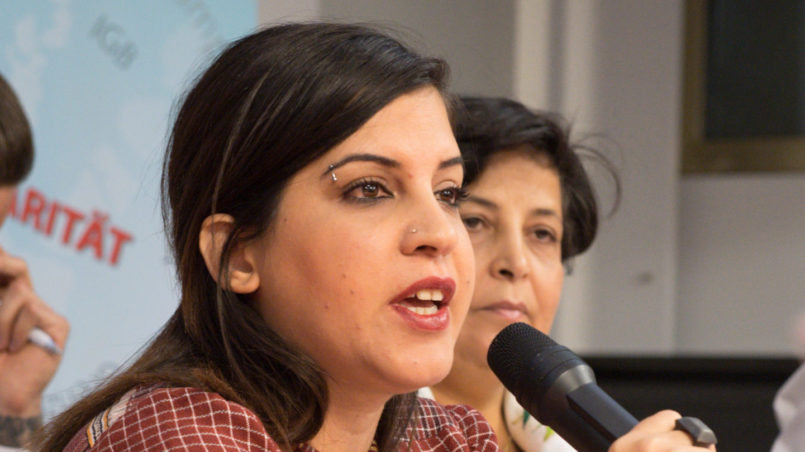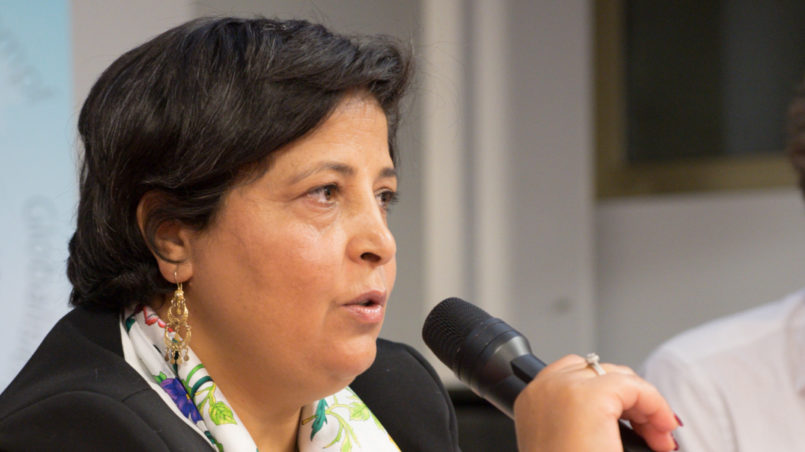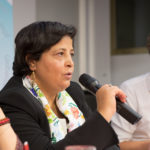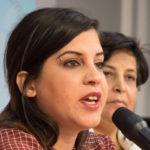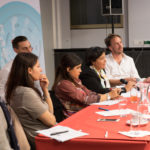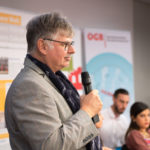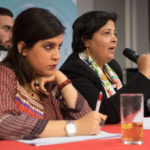Tunisia in Transition
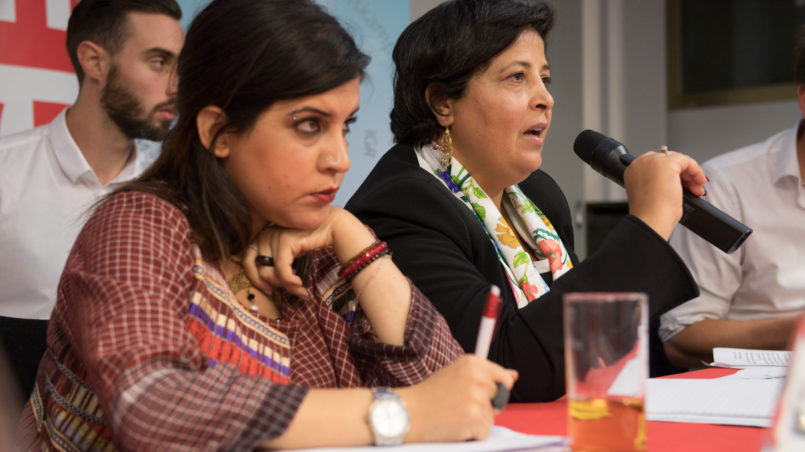
Event data
- Datum
- 11. 10. 2016
- Host
- weltumspannend arbeiten (In Kooperation mit ÖGB, PRO-GE, VÖGB)
- Location
- BIZ AK, Theresianumgasse 16 – 18, 1040 Wien
- Event-type
- Podiumsdiskussion
Women defend democracy
The following people discussed this topic in BIZ AK (training centre of the Chamber of Labour) in Vienna’s fourth district:
- Fatima Bousnina, Trade unionist Petrochemical Tunisia
- Lina Ben Mhenni, Blogger and Internet activist in Tunisia;
with a political contribution from - Muna Duzdar, State Secretary for Diversity, Public Sector and Digitalisation
Werner Drizhal (GPA-djp) chaired the discussion (GPA-djp)
In co-operation with the ÖGB (Austrian Trade Union Association) international department, PRO-GE, VÖGB.
Both women from Tunisia spoke French and their talks were translated by an interpreter after each “paragraph. Therefore, there was little spoken about some topics about Tunisia – during the presentations. However, some facts, hitherto unknown, were elucidated, throwing a new light on this country: How the Revolution came about and the role that the civil society, in particular women, played was presented.
Background 1
In 1956 Tunisia gained independence after having been a colony of France. The new state was grounded without any bloodshed. This is, above all, due to Habib Bourguiba, who was a political prisoner for ten years until 1955 and who negotiated the freedom of the country. Bourguiba introduced an autocratic system, served as a lifelong president and governed until 1987. In this period, he strongly opposed Islamism and tried to create a secular, religiously independent state. In this pursuit, Turkey, under Mustafa Kemal Atatürk was his role model.
Werner Drizhal (directly to the blogger, Lina):
In your opinion, was the Arab Spring in Tunisia a revolution? How do you see the role of the civil society?
Lina Ben Mhenni:
It was a revolution, and we are in a revolutionary process. In 2010 there was an uprising but the country had already been in turmoil since 2008. After the Revolution, there were great advances as regards freedom of expression but Ben Ali’s system of justice has not yet been reformed. The Revolution should have brought employment, freedom and dignity for all but this has not yet happened. I do not support the term, Jasmine Revolution, and this is not common in Tunisia itself. It is mainly used here in the media in Europe. There are many active organisations in the civil society but, in particular, the UGTT (Tunisian Trade Union Association) stands up for the human rights of workers. In 2015 it also received the Nobel Peace Prize as part of the Tunisian (National Dialogue) Quartet.
Background 2
In the Constitution created in 1959, Islam is declared as the state religion – without reference to Scharia. Scharia was excluded as a legal basis. In contrast, the rights of women were strengthened. Women were given an equal position as regards both matrimonial and divorce law. Also in the field of training, measures were introduced to ensure that female children received the same opportunities from the beginning. Bourguiba led the state with a unified party as executive organ. In 1975 he named himself as president for life but subsequently the large trade union, UGTT and the Human Rights League, LTDH, were formed. When he became ill, his wife, Wassila Ben Ammar, effectively controlled the country for over one decade, until their divorce in 1986. Which, amongst others, led to serious conflicts with the Islamists and to the fall of the aged President one year later …
Werner Drizhal:
How are the workers doing and what is the situation for women in Tunisia?
Fatima Bousnina:
First of all I would like to tell you about myself. I am 49 years old and am active as a trade unionist at Petrochemical in Tunisia. Already in the ’80s, the decline of the country began. People were being paid less and less and the situation for women was deteriorating more and more. Although in 1956 Tunisia was still exemplary in this respect. There was equality of status in the case of divorce, girls had the same training opportunities as boys. The founder of the state, Habib Bourguiba, ensured equality of access to schools and vocational training facilities. This changed dramatically after the PSD came to power in the ’60s. Access to qualifications became more difficult for women who are, therefore, currently, often unemployed.
Muna Duzdar (Austrian State Secretary for Diversity):
I grew up in the Socialist Youth and come from Palestine. In 2012 I got to know Tunisia. There I became acquainted with emancipation that did not exist in any other Arab country. It was women, above all, who took to the streets when the revitalisation of democracy was concerned. After the Revolution in 2011 Ennahda was the strongest power in the government and in 2013 Nidaa Tounes won a majority. 116 parties took part in the election and the religious parties were ousted. In the meantime things did not go well: Ennahda and Nidaa Tounes formed a coalition and there were regressive developments as regards equality. Also in the economy there was no development and that is dangerous. In the Arab world, when countries collapse, women are the first victims. Tunisia needs gradual change. When things happen fast, as for example in Egypt, there is regression. Identity is again strengthened via religion which provides stability and orientation. Therefore the women’s movement has to be supported from here.
Background 3
In 1987 Zine Ben Ali became the head of state and further expanded the country to a nation oriented to the west. He promoted the emancipation of women and created a social insurance system but governed as an absolute monarch. In 1992 he married Leila Trabelsi who, together with him, introduced a system in which all their relatives made money from the wealth of the state. As a result of this exploitation and the economic decline which it caused, the population in the mining districts rioted in 2008 and the miners rebelled against the state phosphate corporation. The headquarters of the state mining company and the trade union was occupied. 4,000 of Ben Ali’s police officers held Redeyef in a stranglehold. Thirty-four people died. Thousands were arrested, the local strike leader sentenced and thrown into prison. Not only men but also women fought on the front line. Afterwards the protests continued and the nepotism and the dictatorial style of government led to a strengthening of Islamic power and recently in 2011 to the wrongly-named Jasmine Revolution within the uprisings of the Arab Spring. The trigger for the initial protest was the self-immolation of the 26-year-old vegetable trader, Mohamed Buuazizi on 17th December 2010. During the protest a further three people set themselves on fire. In the end there was the coup, Ben Ali fled the country but not without (so it is claimed) having his wife smuggle an immense amount of gold out of the country.
Werner Drizhal:
What strategies are there to integrate women?
Fatima Bousnina:
Ennahda is not a moderate party although it is sometimes so presented. There is a close connection to Erdogan’s AKP. It has a strong religious background and only because of the revolt of the population, was it possible to prevent Islamic acceptance. I come from a poor village and had to help my mother so that my brother could study. I myself had no training although I was entitled to it. I passed my school leaving exam very late and afterwards I began to study. For women it is very important that they are helped not only with training but also with microcredit, which allows projects to be realised and serves to improve the situation. Women have prevented women’s rights from being restricted again. What can be done? The laws on equal treatment have to be put into practice. Women should be encouraged to look after themselves. Women have to have access to microcredit.
Lina Ben Mhenni:
I agree: When governing alone, Ennahda tolerated the spread of Islamism. Now, young, liberally-thinking people want to leave Tunisia. Ben Ali has destroyed the education on offer. Many young people held high hopes after the Revolution, but now feel betrayed by the political classes. The split of the Nidaa Tounes party is also a great cause for concern. Terror organisations become attractors for young people who believe they have no perspective. This explains the great popularity of Salafism.
Muna Duzdar:
There is a huge divide between the towns and country. The lack of perspective of the young is a breeding ground for extremism. Tunisia would be democratic, it is reported, but religious fanaticism is spreading among young people who are unemployed.
This can only be countered by means of financing for the civil society, NGOs and the women’s movement. Ennahda is not moderate. In 2013 an opposition politician was murdered. In the Constitution one wanted to establish a stronger reference to Scharia. This was averted by the civil society. The system has to be further changed from within. Right-wing populists and religious fanatics are similar in many respects. Both have to be fought.
Background 4
As a consequence of the overthrow and the fleeing of Ben Ali, the country was re-organised. In the first free election, though, the party of the Islamists, the Ennahda, was the strongest power. From this an enormous field of tension developed between the mostly liberal youth and the movement which wanted to implement change towards Islam. While the Constitution was being newly written, there was a major uprising of the population. From this emerged a collective movement, Nidaa Tounes. Women in particular took to the streets because they feared a setback. The civil society, primarily the trade unions and the Human Rights League, together prevented a return of an Islamic state. In 2014 the new Constitution was passed and a new exemplary democracy in the Arab world appears to have been born.
Question from the representative of Idealism Prevails:
Nidaa Tounes is splitting at the moment. Is it wise to support this and to risk the emergence of an Islamic government again?
Lina Ben Mhenni:
I do not want to comment on the split; Fatima can do that much better because she is in the party. The situation is significantly better than anywhere else in the Arab world. But investments have to be made in the country so that it does not slide into the Islamic camp. Travel warnings should not be issued since comparable countries do not have any. Greater support is expected from the trade unions in Europe.
Fatima Bousnina:
Poverty has still not declined in the country. The town/country disparity is still present. The new government announced that this problem would be solved. But it does not do anything. In the greater part of the country there are smugglers and a black economy. And that leads to great problems. The tension within the Nidaa Tounes party leads to division due to the work in the coalition government with the Islamists. When the party entered the coalition, everyone was disappointed. Many members of parliament left the party. At the same time a son of the party’s founder is demanding the leadership and wants to come into power.
Muna Duzdar:
It would be necessary to send trade delegations to Tunisia in order to strengthen the democratic forces – with visible growth. It is not enough to ask: “What can we do?” Only if one goes there and sees the problems, can one also recognise where help is needed. Tunisia has the largest trade union in the Arab world. Therefore one should begin in Tunisia in order to stimulate further democratic developments in this region. Tunisia was a police state and became a democracy. It is still lacking the democratic know-how, but Europe could provide this.
Interjection from a representative of the Austrian-Tunisian Society:
Next year we will send 60 trade unionists to Tunisia. And we will bring trade unionists to Austria so that they can gain experience of our organisations and structures.
Background 5
In the further development after the Revolution, the large majority party, Nidaa Tounes, ran into difficulties. One reason was that the movement, from the beginning divided into two camps, was to be led by the son of the outgoing party leader, in accordance with the wishes of the latter. This angered many because they did not want to have one dictator whom they had driven out to be replaced by another. The result of the exodus of many members of parliament was that the Islamic party, Ennahda, could once again become the party with the greatest number of members of parliament. Since then many in Tunisia fear that Islam could again gain in significance. The party itself is trying to create a split between religion and politics and, at the 10th party conference, it renounced the term “political Islam”. Democracy is upheld and preserved as a value but the economic development continues to be difficult.
Werner Drizhal:
What do the women in Tunisia expect from us in Austria?
Lina Ben Mhenni:
I would first like to express my gratitude for the help from Austria. We need many concrete projects. The Tunisian population is active but cannot be left alone. It is important to continue to build up the state. Tourism is also important. We are extremely hopeful.
The Tunisian people are strong and will prevail.
Fatima Bousnina:
The integration of women in the trade union would be a great help. The trade union was established in Tunisia in 1924 but there are still too few women active in it. Training facilities for young trade unionists are also lacking. The economic situation is not very rosy. Academically-educated unemployed, in particular, have to be supported since otherwise they will migrate to other countries.
Werner Drizhal (directly to the State Secretary):
How can international solidarity be organised?
Muna Duzdar:
In spring we had an event with Tunisia as its focus. At the time, I hoped that this would lead to sustainable policies and I am therefore very happy about today’s event, which takes us further along this path. Unfortunately internationalism has lost importance. Everywhere, one concentrates on one’s own country. Therefore it is important to think about what must be done so that we can identify with countries like Tunisia. Precisely because these countries could serve as examples of how Islamism could be dealt with.
We need exemplary solutions in the region, which could spread to the neighbouring states. We should once again bring a “WeThink” atittude into society and be Aware that we are all responsible for each other.
The chairman concluded the discussion and thanked those present for their attendance and keen interest.
Translation into English: Donna Stockenhuber

